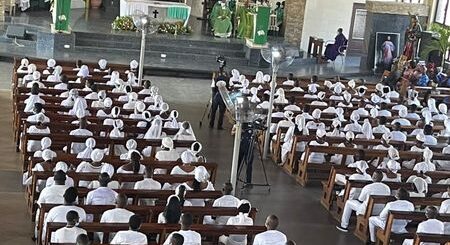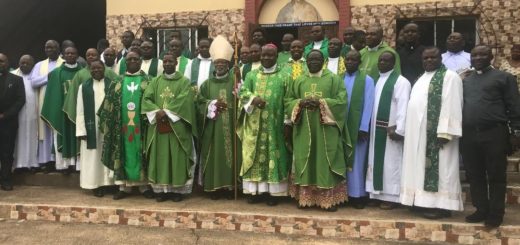The King who chooses the Cross as His throne
by ARCH BISHOP · April 13, 2025
PALM/PASSION SUNDAY, 13TH APRIL, 2025, OUR LADY QUEEN OF NIGERIA PRO-CATHEDRAL, ABUJA. HOMILY BY ARCHBISHOP I. A. KAIGAMA.
READINGS: ISAIAH 5:4-7; PHILIPPIANS 2:6-11; LUKE 22: 14- 23:56
Theme: The King who chooses the Cross as His throne.
Today, during this liturgy of Palm Sunday our Gospel reading taken from St. Luke, pictures Jesus riding into Jerusalem “humble, and mounted on a donkey” (Zachariah 9:9). The crowd was ecstatic, shouting and rejoicing, throwing their cloaks on the ground saying, “Blessed is the king who comes in the name of the Lord!”
The Jews expected the Messiah to be a powerful political figure who would rescue Israel from Roman rule and restore the kingdom of David by physical force, an expectation rooted in the Old Testament prophecies, such as the Prophesy of Zechariah which described the Messiah as a king who would come. So, when they saw Jesus on a donkey, the crowd, which comprised Jewish pilgrims, recognized Him as the Messiah and shouted “Hosanna in the highest.” They were dreaming of a revolution, of Jesus overthrowing the Romans. They certainly misunderstood the nature of Jesus’ mission and kingship. They expected a political saviour, not a spiritual one who would conquer sin and death. This misunderstanding eventually led to their rejection of Jesus and to His crucifixion. This explains the sharp contrast between the joyful acclamation at the gates of Jerusalem and the loud silence of the Cross at Calvary.
Passion Sunday draws our attention to the burden Jesus had to bear for our sins and the evils we have committed. He did this out of a most generous and selfless love. He deliberately entered Jerusalem not for a social celebration, but for some painful encounters which included accusations, betrayal, condemnation, insults, beatings, crucifixion, and death.
The readings today paint a vivid picture of His mission: A King who reigns not by power but by love; a Saviour who conquers not by force but by surrender; the King who weeps; the Servant who suffers, and the God who loves to the end. The readings invite us to enter into the mystery of Christ’s Passion, not as observers, but as participants. We do not merely remember what happened, we are drawn into it. As the Church celebrates this sacred liturgy, we wave palms (a symbol of triumph and victory in Jewish tradition) not as a reenactment, but as a reminder that the victorious Christ continues to walk this road with us and within us. He is Emmanuel – God with us.
The first reading from Isaiah introduces us to the Suffering Servant, a figure that prefigures Christ. He is beaten, spat upon, insulted, yet, He does not retaliate but keeps going, trusting in God. He listens attentively to God, and He entrusts Himself to the Lord even in the face of violence. Here, we see a model of holy endurance and unwavering trust. In our own lives, we, too, encounter misunderstanding, betrayal, and pain. Like the Suffering Servant, we are called to anchor ourselves on God, not on the approval or acceptance of others. The path of discipleship will include suffering, but it will never lack the presence of God. Jesus’ cry, “My God, my God, why have you forsaken me?” was not an expression of doubt or regret.
These readings reveal to us the true nature of divine love, it lowers itself, serves, and gives without counting the cost. Christ did not cling to power or demand His rights, He descended, in order to lift us up. His humility becomes His glory. And in that, He sets the pattern for all of us. If we want to rise with Him, we must first learn to bend low in service and love.
In the Passion narrative, we journey with Jesus from the Upper Room, through Gethsemane, the betrayal, Peter’s denial, the unjust trial, the scourging, and finally to the Cross. Every step reveals Jesus’ unwavering obedience, His deep love for His Father, and His limitless love for us.
Lessons:
• We see how they shouted “Hosanna” and then suddenly “Crucify him.” Are we surprised? Don’t we do the same? We very solemnly receive Jesus in the Eucharist only to go out and live a life that contradicts all we have received? We say, “Jesus I love you, all I have is yours, yours I am, yours I want to be, do with me whatever you will,” but proceed after to live a life of jealousy, dishonesty, lies, hatred, evil, etc.
• Christ shows us today that true greatness is found in humility, not pride, and true love is tested in trial, not comfort, just as true discipleship means walking with Jesus not only in moments of glory but also in moments of pain.
• Today’s celebration calls our leaders to be merciful leaders eager to provide basic amenities for their people. We call on leaders, not to be carried away by people’s hailing and calling titles such as “Your Excellency,” “Distinguished,” “Honorable,” “Your Majesty,” “Your Eminence,” “Your Grace,” etc., but to be determined to achieve the purpose of their being leaders. Political leaders should be aware that in our country today, after election victory, people shout “hosanna” to their leaders, but with hunger and insecurity ravaging our dear country, and when people are at breaking point, they shout in desperation “crucify them, crucify them.”
• The same happens to religious leaders, especially when we promise wealth, healing, miracles, and people don’t see these, because these promises are not rooted in the Lord. They will shout “crucify them,” in our case too because some of us are deceitful, dishonest, manipulative, and self-centered, and even recklessly use the funds the congregations make great sacrifices to collect.
• Leaders should learn that only once did Jesus allow people to sing His praises. Always, He would shun anyone who tried to praise Him publicly. But today, when He was marked for death, He entered Jerusalem publicly and allowed the multitudes to sing His praises. This was because His hour had come. If you are not ready as a leader to sacrifice your time and life for your people, then, don’t allow them to elect you, let alone to sing your praises.
• We learn also today that we should not command God in prayer. At the Garden of Gethsemane Jesus prayed: “Abba Father … remove this cup from me; yet not what I will, but what you will” (Mark 14:36). It will be nice if we add this clause whenever we make a request of God, to do not as we will but as He wills instead.
May this Holy Week be for each of us a time of deep conversion, solemn reflection, and renewed love for the One who gave everything to save us. Let us remember we are not alone. Christ walks before us, with us, and within us.
HAPPY AND FRUITFUL HOLY WEEK.



